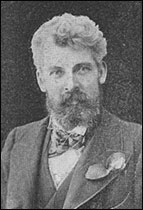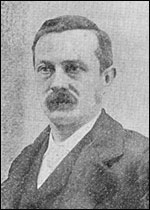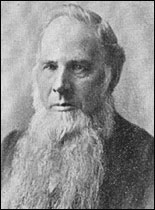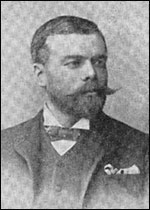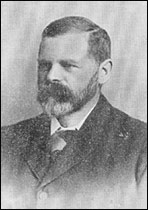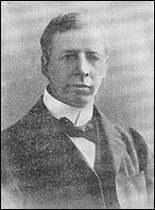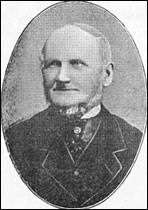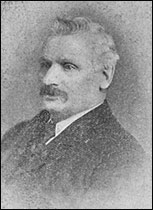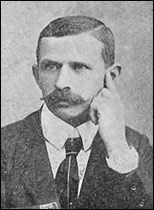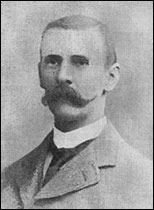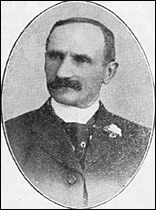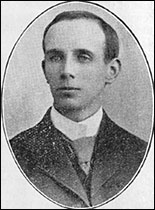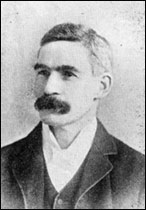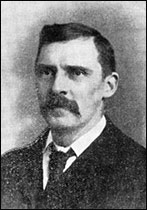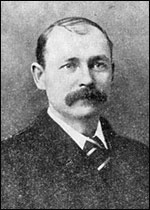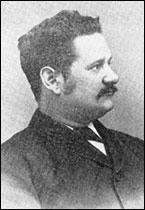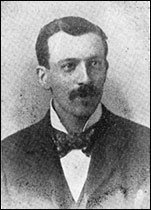|
|||||||||||||||||||||
| Transcribed by Kay & John Collins 2007 |
|||||||||||||||||||||
|
Rushden and Its Industry - 1900
|
|||||||||||||||||||||
|
This delightful little booklet was loaned for our project.
It has no date or author or printer or publisher so all we can do is transcribe it here. The historical content is superb both for the town and trade, but also has much genealogical information. Mention of the Queen Victoria Hotel being under construction at the time of writing leads us to assume the date was 1900. |
|||||||||||||||||||||
|
|||||||||||||||||||||
|
The town of Rushden - for it can no longer be styled a village - has risen to very considerable eminence as a shoe manufacturing place in the space of one generation, and from a village of 1,748 inhabitants in the year 1861 it has now an estimated population of nearly 12,000. Very few places can show a better record, although, since the introduction of machinery into the manufacture of all kinds of articles, there are many centres of industry that are of almost miraculous growth. If ignorance, in the shape of Chartism, some sixty years since, had prevailed in limiting the use of machinery, what would have been the result as against the progress realised to-day? In our own, or present time, that same ignorance that blindly aimed at suppressing machinery in the past is quite as potent for evil to-day in the form of trades unionism. The aim of the leaders of this movement is at one with those of the past generation, and, if successful, would do as much harm as that would have done in the way of arresting progress. Men untrained in the economy of business can never be safe guides, any more than the Soudan Campaign could have been as successfully accomplished under the leadership of the best commercial traveller that works the district, as under that of Sirdar Kitchener. Any organisation that restricts or hampers production is a fatal mistake, and directly opposed to the truest interests of working men, as well as to other classes in the social scale. The folly of the past should be the lesson of the present. The qualities that accomplished the development of Rushden in shoe making are evidenced in the younger members, and their surplus energy finds expression in cricket, football, music, etc., and whatever they set themselves to do they do it with all their might. They are as good at play as at work, and there is no doubt but that a boy who is lazy at play will be equally so at work. Their efforts in the engagements narrated above have been successful past all expectation. The name of Rushden is very familiar far beyond the limits of the county. It has contributed to the county cricket club some prominent members, and still does so. There is perhaps an underlying current of force in the shape of a movement that took a hold of the place some fifty or sixty years since, and continues to wield a power in it, known as the Temperance Movement. The men who have risen to eminence as manufacturers are almost to a man members of this body, and their successors are as strongly imbued with the same spirit. Temperance is too often associated with intemperance of advocacy, but for that there is much excuse when we see the fearful evils resulting from drunkenness. The education that produced the result seen to-day in the customs of the nobility and City magnates, and that is firmly established in middle-class society, must come on down the scale till it reaches the working man. We never hear of "three-bottle men" now, and for a lord to be seen in liquor would be to be banished society. The worst form of drinking now in business circles is that of ardent spirits, in place of wholesome beer; in fact, the evil is growing among women, from the same cause. This may seem an unwarrantable digression from a history of Rushden, but it is part and parcel of its present position. In the distant past it must have been a place of some importance, judging by the extent and excellence of the parish church, which was formerly collegiate. It is a spacious and beautiful structure, with a spire rising to a height of 95 feet from the tower, the total height being 192 feet from the ground, and, standing as it does on an eminence, commands an extensive view of the county. To students of ecclesiastical architecture it is full of interest, as containing many examples of various dates and styles, some almost unique. Many pilgrimages are made to it by those devoted to archaeological lore. Rushden Hall, the property of H. Sartoris, Esq., is one of the old country mansions, and has more historical interest than most, having been more or less a Royal residence in the persons of the Dukes of Lancaster, notably that of John o’ Gaunt, who owned the castle in the adjoining borough of Higham Ferrers. The Hall stands on an elevation, surrounded by charming accessories of park, gardens, and pleasure grounds. The house is quadrangular, and principally consists of a retreating centre and two projecting wings, and once possessed one of the finest old entrance-halls in the county, but now incorporated with other apartments, and scarcely a trace remains. The village originally consisted of one long street, bending round by the church, being the turnpike road from Higham to Bedford. There were colonies out of it, such as Duck-street—a name well-chosen when contemplating the unsavoury nature of the stream running through it, sometimes in flood of a disastrous nature, at others only the channel of sewage draining the upper and more populous part of the village on the Bedford side. Here a few narrow lanes lead out of the main thoroughfare, where still may be found cottage buildings of an ancient date. The houses on one side of High-street were set upon a high bank over the road, but recently the newer erections have been brought down to a more reasonable level. Still, much remains to be done to make promenading on the footway pleasant and comfortable. Those who speculated in house property some twenty or thirty years since have reaped a fine harvest of profit, as values have risen nearly tenfold in the meantime. The native stone of which the houses were formerly built is not prepossessing in appearance as regards colour, but stone is now discarded. The new erections of brick and slate roofs stand out in strong contrast to the stone and straw-thatched roofs of the old houses. The first two cottages built of brick were erected in the year 1849. The shed was standing a few years since on the Bedford-road that was used as a shoeing forge for cattle that were going to the London market. Before the railways were opened, the cattle sent from this district to London had to be driven the whole way, and were lightly shod to prevent the wearing away of the hoof. This district contributed largely to the supply of London beef, as it does at the present time. Gas was introduced about the year 1864, and much larger works were erected in 1892 to meet the greater demands upon it, the company undertaking the supplv of Higham Ferrers at the same time. Water supplv followed in 1895, but as the quantity proved insufficient to meet the requirements of the town, a further supply is being sought for that, it is hoped, may not fail to meet the increasing need. Since the Local Government Act came into force, there is a greatly improved condition in the state of the streets in wet weather. The roads were made from the lime scoræ of the local iron works. This soft material ground down to powder in a very short time, and made mud of a beautiful consistency in about a week in wet weather, and dust like flour in fine, that was the delight of housemaids, and kept them in full employ. It was a sight to see the children trudging to school, plastered with mud as soon as they were fairly out in the street. Side-paths and the addition of granite in the repair of the roads have very much improved the condition of things in this respect. The High-street, with its charming variety of hill and dale, is certainly not monotonous in its environment. Each owner of property, when rebuilding the houses forming the line of streets, followed his own cue in the matter of style and elevation, with this result—that one is in the sky and the next perhaps in a hollow. Holborn Viaduct on a small scale will be necessary to bridge the dip in the road running past "The Cottage." Accommodation for man and beast is fairly well provided for, although there are less public-houses in proportion to the population than in any other town or village in the United Kingdom. This statement is not likely to provoke a challenge from any quarter. In 1882 a company was formed and a coffee tavern erected—a building of striking appearance, giving accommodation of a wide and varied character, under the efficient management of Miss Cox. All classes are catered for, and at such reasonable rates that the poorest may have the wherewithall to satisfy the claims of hunger, and at the same time visitors to the town, on business or pleasure, can have bed and board of the best quality. A good ordinary is provided daily. Attached to the main or hotel building is a spacious hall, where concerts and meetings of all kinds are held. A club, patronised by the leading inhabitants, holds its meetings there in the evening, and monopolises one of the billiard-rooms. A few years since another hotel of the same character was opened, and is now under the proprietorship of Mr. Walker, and is known as "Walker's Restaurant." Every care is shown in the management, and the catering is all that can be desired. There is an hotel at present in course of erection near the station, the property of Messrs. Phipps and Co., brewers, of Northampton. This building is of a most commanding appearance, and will rival any in the county, including the county town of Northampton. Ample accommodation will be provided here for the present and future wants of the town and district, there is little doubt, judging by the extent of the premises. The design is that of Mr. P. W. Dorman, of Northampton, and the builder is Mr. G. Henson, Wellingborough. No expense has been spared in producing a building of exquisite beauty that no town need be ashamed of, and one that will give tone to the surroundings, and should provoke a friendly rivalry in any future erections, whether for factory or other necessity. There are only seven public-houses in the parish, but perhaps it may be better, for various reasons, that there should be a few more. A little healthy competition would lead to improvement in the quality of the drink supplied, but there is another that outweighs this in point of importance, viz., the establishment of clubs. These latter are not an unqualified advantage to any community, as they are not under the supervision of the police, and are not restricted in the matter of hours, nor are they under the same check as regards gambling. Under a very filmy cover as regards membership, drinking and gambling can be carried on to any extent without let or hindrance, to the disadvantage of properly licensed houses, where, in addition to a heavy drain by the Imperial exchequer and also local rates, they are unfairly competed with by these clubs, who pay no licence for the sale of intoxicating drinks of every description which are supplied. There is no difficulty in providing suitable buildings for clubs, as they are a sound and profitable investment for brewers, who secure the custom under the mortgage deed. Publicans would very much prefer a licensed competitor to these unlicensed ones. The initiative of the shoe industry came from Higham Ferrers, where it had existed for a long period, chiefly in connection with supplying the Army and Navy, and had the same conditions as regards property prevailed in Higham as in Rushden, the preference would have remained with the former beyond a doubt, and the old borough would have greatly enlarged her boundaries. In Higham the law of entail barred the way to development, through the difficulty of procuring free land upon which to build factories, whilst at Rushden plots of free land were abundant. There is no inducement to erect expensive premises upon another man's heritage, even if long leases are to be had, as, sooner or later, it passes to the original owner, without compensation for improvements. This question of entail is one upon which there is much controversy, although, in a general way, it adds stability to the constitution and secures perpetuity in possession. As far as regards agricultural land, it is distinctly an advantage, and links the present with the past, and is almost the only survival of the feudal system. But when we come to consider the exigencies of manufacturing—a thing unknown to our forefathers—we are bound to admit that it is in the way and hampers development. We are now known as a great manufacturing people, and have to find the bulk of our food-stuffs in foreign lands to supply our daily needs, and anything that interferes with the expansion of our industries must give way to such pressing necessities. In manufacturing centres this law of entail should be set aside, so as not to hinder the growth of the particular industries cultivated.
The next to start was Mr. W. Colson, in 1854, who eventually built a factory in Wellingborough-road, where the business is still carried on by his son. In the early days the factories were of modest proportions, and as machinery was in its infancy, the work was done by hand in the general way, and at the workers' homes. Very little room was required, beyond space for storage of leather and stock-room, but, as the boots were sent away as fast as they were made, very little provision was necessary for the latter other than for packing. Clicking and rough-stuff cutting, of course, had to be provided for. Mr. J. Cave was the next to start, soon after Mr. Colson, in the same year. In 1880 [actually 1877] he had the misfortune to have a fire, and, in addition to the loss of premises, he also lost a son through the falling of a wall. A much larger building took the place of the old one, but the various additions since that date, and especially the present, puts the old into the shade. When completed, the present building will rank as one of the largest, if not the largest, in the country, and furnished with the most complete set of machinery, very much of which is of their own invention. The management of the business is in charge of his four sons, of whom he may be justly proud. In addition to home trade they do a very large Colonial and foreign business, as, for instance, in South America, South Africa, Australia, and New Zealand. In all these countries they have a firm hold of the trade through personal representation, and are in touch with the best houses. This enables them to cater for the various tastes and requirements—a thing much needed now that foreign competition is so severe against us. They also undertake Government contracts, and are running a very large one at the present time. Their offices in London are at 36 Basinghall-street, and they have a branch factory at Stanwick. Of the four who started the trade in Rushden, only one survives, in the person of Mr. J. Cave, the senior of the firm, who, from appearance, has a fair share of health and life stored up in him.
Mr. W. Claridge began business on "The Green" in the sixties, and eventually built a factory in Wellingborough-road, and large additions have been made by his two sons, Messrs. John and Charles, the present proprietors. The premises are of an extensive character, and are capable of turning out an immense quantity of boots. Mr. Claridge died in 1891, but practically he had not taken an active part in the business for many years, his sons undertaking the management. The business developed considerably under their efficient control, they having steadily maintained the general excellence of quality and finish that characterised the goods produced by their father.
Mr. W. Green's factory is situated in Queen-street, but was formerly in High-street, and is both extensive and well-appointed for the general purposes of the trade cultivated. The firm is now known as Messrs. W. Green and Son, the son having been admitted into partnership.
Mr. S. Skinner, one of the quiet but modestly successful men, is content to hold on in the premises occupied by him for many years, and is not moved to rush into the new conditions of warfare and elbow others out, but evidently intends to take things quietly for the remainder of his days. |
|||||||||||||||||||||
Sanders and Sanders occupy premises erected by them in the High-street, near the Midland Station. The senior brother died some years since, and the business is continued by the surviving partner. Messrs. W. Sargeant and Co.'s factory is situated in Crab-street, and is of substantial appearance and well-appointed. This business was conducted for many years by Mr. Walter Sargeant, who had not the most robust health, but he eventually admitted his brother Alfred into partnership, who from that time assumed the practical management. The senior partner died in 1896, and since that event the business has been carried on by the junior partner, assisted by the widow, who always took an active part in the counting-house department.
Mr. H. Bull, brother of the above, has commodious premises in Harboro' Park, where he carries on a very successful business and employs a great number of people. Mr. Bull, sen., was associated with the trade from the first, and brought his sons up to it, and by his example helped them to earn success. Messrs. Cunnington Bros, have fine premises in Park-road and Crab-street replete with all the latest machinery, and produce a good, useful boot that has a firm hold of the market.Messrs. Knight Bros., of Newton-road, have been established many years, and have a reputation for a very sound, well-finished article. It is this class of boot that caused Rushden to forge ahead. Perhaps the finish was not quite up to the level of Northampton, but solidity was there and good material, and that is bound to tell in the long run. Mr. E. Wrighton has recently erected a very fine factory in the Pightles Estate, which gives him ample room for development in the future. In his former premises, in Crab-street, he was "cribbed, cabined, and confined". Since the movement was on foot to make manufacturers find room for the men to work on the premises, considerable additions had to be made and much expense incurred. This was not at the insistance of the men, the majority of whom prefer the freedom of the "Barton" to the stated hours of the factory. Messrs. Jaques and Clark now occupy the premises built and owned by Austin and Bond, of bankrupt fame. This firm (Jaques and Clark) have made considerable headway, and are doing a large business of a very different character to that of their immediate predecessors. Before occupying these premises they were located in Fitzwilliam-street, where they had not sufficient scope for their energies. Very near to the above stands the factory of Mr. H. Perkins, who, in a quiet way, is doing a very considerable business of a sound and useful nature.
Mr. B. Ladds has convenient premises on the Fitzwilliam estate, where he has developed a considerable business in the comparatively short time since he started. It is not always that length of time is the measure of success, as force varies in human nature as in other things, and energy is bound to force itself to the front. Messrs. Clark and Lennett, of Church-street, have carried on a successful trade for some years, but the junior partner retired from the firm, having satisfied his not too covetous desires, and left his partner to increase his worldly goods to the bent of his ambition. There are some other firms that have come to the front within the last few years that are making good headway, and will be better known as time wears on, like those already noticed, but space prevents our enumerating them all, as this is not a trade directory. Such men as these give stability to the trade, and keep up the character of the town, but the crowd of the mushroom order that struggled into existence recently are nearly disposed of, it is to be hoped, in the interest of the whole community. The misfortune is that they are encouraged to come to the front by a certain class of purveyors of leather, the requisite being the ability to sign and accept a bill at short notice. The migration of Messrs. A. Groome and Sons from Higham Ferrers to Rushden occurred in 1890, when they erected a large factory on Rushden Hill, on the one-floor principle, where they are doing a very large business. They formerly made a specialty of nailed work, but Kingswood prices rendered that an unprofitable business, and they set themselves to develop another specialty, in which they have been eminently successful. This is a lighter class of boot, veldt-stitched, in colours as well as black, for home and foreign trade. They have met with great success in South Africa and South America and India, in all of which countries they are well represented. To those who know the brothers who constitute the firm, their individuality of character gives the cue to their enterprise.
Mr. Charles Sanders, whose factory is in Duck-street, has carried on a considerable business as a currier for many years, particularly giving attention to local wants for current use, such as coloured goods and linings, etc. Only a few years since he would have repudiated such a trade as beneath his notice when good kip butts and calf skins were in better demand than they are now. He still produces a fair quantity of these goods for Army purposes.
In proof of the extraordinary development of the trade, a glance at the carrying power of the past and present will convey something like an idea of its growth. Mr. Green, the late station-master at the London and North-Western Railway, Wellingborough, told the writer a few days before his retirement from the post, that during his term of office he had sent two single-horse carts two days weekly to bring away the shoes for their destinations, and at that time, it must be remembered, the Midland Railway had not reached London. Now the same railway sends six trolleys daily from Higham Station, and, in addition, a railway has been opened by the Midland from Wellingborough, with a large depot, employing nine trolleys daily in collection and delivery of goods. This railway was opened on September 1, 1894, for goods, and on May 1, 1895, for passenger traffic, Mr. H. Pitt being appointed station-master, who, it may be said in passing, is appreciated by that much-enduring body, the "commercial" community, who leave no stone unturned in their efforts to supply the needs of their patrons and give Mr. Pitt employment. Here again would be another proof of the growth, if it were possible to give the number of representatives who work the place now, in contrast to the few who did duty twenty five or thirty years since. The goods and passenger accommodation of a past age were represented by two inns on the Bedford-road, almost under the shadow of the church, and were known as the "Coach and Horses" for passengers by coach, and the "Wagon and Horses" for goods by the "van" conveyance. The latter still remains, but the "Coach and Horses" is now appropriated for cottages, the licence being transferred to the "Oakley Arms", at the junction of the Wellingborough and Higham roads. The old inn that was is a very interesting building of considerable proportions and of ancient date, the property of H. Sartoris, Esq. Rushden has had its labour troubles in common with other centres of the trade. A branch of the Union was formed here in 1889, and a strike of six weeks' duration occurred in November, 1890, but fortunately concluded shortly before Christmas, followed by another in the spring of 1894, when much distress prevailed. The following appeared in the "Northampton Herald" just prior to entering upon the struggle : — "Serious Illness of Prosperous Shoe Trade, Esq., Rushden”. "It is with great regret we hear of the serious condition of our old friend, and as the crisis is rapidly approaching our anxiety increases. The position he has attained with advantage to so many has been brought about by the able assistance of his three sons—Energy, Ability, and Perseverance. He enjoyed for many years the most robust health, but some three or four years since Dr. 'Strike' set up a practice at Rushden and introduced a quack remedy, a pill called Unionism. The old Squire was induced in an evil moment to try one, and from that time he has not been able to shake off the effects. He had a serious attack in the spring of this year, and struggled manfully against it during the summer months, but the autumn winds seem to have been too strong for him, and have brought about a sudden and serious relapse. The family contemplate a change in medical treatment, and are likely to call in the assistance of Dr. 'Lock-out' should there be no improvement in the patient. "We cannot bring ourselves to contemplate the loss of our old friend, who has been the means of good to so many, and whose loss would mean nothing short of disaster to the whole community, as his sons are almost certain to realise the estate and retire from the neighbourhood." "We earnestly hope our next report will be that the crisis has been successfully passed, and that our old friend is on the convalescent tack, and may survive to a ripe old age." Another partial affair occurred in 1894, at Messrs. C. Bull and Co.'s factory, and lasted fourteen weeks. The old county cricketer kept his wicket and scored so well that the Union had to retire, badly beaten. This was one of those cases of worrying the masters in detail that had the effect of driving them to combination as a defence against the tyranny of the Union. With the advent of Canon Barker, in 1869, the cause of education was entered upon with something like vigour. Up to this period only very limited efforts had been put forth to meet the crying want of education. Since that time the School Board system has come into prominence, with its added powers of compulsion, and leaves nothing to be desired but a careful handling of the purse-strings by those who too frequently are called upon to spend the money, in the shape of rates, that others have to pay. The new broom proverbially sweeps clean, but no doubt it will show the effects of wear in due time, and, as a result, more care will be exercised in selecting the members of the various spending boards of our towns and districts. There is one department of education that has shown much activity in resource, viz., cultivation of language of a peculiarly offensive character. We were to have much benefit if we would only educate the masses. The results are apparent in language of the foulest and most filthy nature, issuing from the mouths of men and boys of all ages, and sometimes from those of females. The advantage of reading is that the evening paper, containing the results of the latest race-meetings, are eagerly scanned to determine the effects of their gambling operations. Canon Barker found plenty of work to do in resuscitating the fallen fortunes of the Church membership, which had declined materially, but, thanks to his untiring efforts and splendid life work, he was enabled to restore the fabric and fill the church with earnest worshippers. The new element that had risen to power were almost to a man of Nonconformist principles, but there was no cause of quarrel with the rector, with whom they engaged in promoting all that was for the public benefit. The "squire" (the title by which Mr. Sartoris was generally known) was a good supporter of the rector in all matters pertaining; to the parish, and few places could boast a more popular squire and parson. He was succeeded by the Rev. C. J. Gordon, who during his residence opened up and built a mission church on the Fitzwilliam Estate. The work is being successfully carried on by the present rector, the Rev. R. W. Morse, M.A. There are many Nonconformist places of worship in the town, and some of them of an imposing appearance, and all are well-supported. The Wesleyans have two, the Baptists also have two, and the Independents one. There are other chapels of smaller dimensions, including the Salvation Army. Ministers of considerable ability have laboured here; among them the names of Drawbridge, Bradfield, and Bromage stand out boldly, and are known far beyond the limits of Rushden. With a large increase in population the professional element are certain to be attracted, and no less than five medical gentlemen feel called upon to arrest the decay of nature, and all are appreciated in their efforts; while, as for legal help, four full-fledged solicitors are at the service of all who require to protect their interests or assail those of their neighbours or others. Two of these gentlemen are of native growth—Messrs. G. Mason and R. Claridge. A branch of the Northamptonshire Union Bank, under the management of Mr. Ashdowne, was opened in 1889, and was followed by a branch of the Capital and Counties Bank in 1890, under the management of Mr. Karn. These two premises add considerably to the appearance of the High-street, as they are fine elevations. As an illustration of the determined enterprise of the inhabitants, we may quote the success of the annual show of the Northampton Agricultural Society for 1898, which was held in the town on June 15 and 16, and proved to be a record one, and earned the well-merited verdict of "Well done, Rushden!" in the "Northampton Herald." The meeting was held in two fields of about twelve acres, on the Wymington road, and adjoining Rushden Park, the site being well chosen as easy of access and as admirably adapted for the requirements of the show. The arrangements were all that could be desired, and made success a certainty. Great fears were entertained when Rushden was proposed that failure would necessarily ensue, as the place was so little known to fame and away from the main lines of railway, but it was eventually decided that the show should be held there, and Rushden rose to the occasion, determined to justify the choice of the society. The decorations of the High-street were of the most elaborate description, and as in its changing variety of line and elevation it affords ample scope for artistic effects, the various points of vantage were well developed by those who were entrusted with the arrangements, and gave an earnest of the welcome awaiting the visitors. The illuminations at night were quite equal to the display above noticed, and were much appreciated. Only on one other occasion— at the county town—had the receipts of the show exceeded the amount received here, but the number of visitors at this was far in excess of any previous gathering, 1,500 having passed the turnstiles by six o'clock, and after that time there was no means of checking the numbers who were being booked outside. The supreme satisfaction of those who had guaranteed the expenses was that there was a good round sum in excess, that gave a liberal balance in favour of the society—an unusual experience for some time previously. Rushden is greatly indebted to two of its most able citizens in the persons of Mr. George Denton (of B. Denton and Sons), and Mr. John Claridge, J.P. (of Mr. W. Claridge). Necessity invariably produces the man, and, as much was required to be done in the constant expansion of the town, it devolved upon someone with brains and energy to take direction. Mr. Denton gave his services without stint in all matters, and always enjoyed his constituents' confidence in his efforts to serve them, as he did on the various boards. He was the first representative on the County Council, and is now supported by Mr. J. Claridge, who was elected in the autumn of 1898, being an additional member granted to Rushden, and who, in a somewhat different political mould, has also the entire confidence of the constituency in all matters. Both have been identified with all that makes for progress, and are a tower of strength in their various local engagements. A review of Rushden without some reference to the district would not be complete, as it was the last to move in the matter of manufacturing. Higham Ferrers could give it a long start, as well as Raunds and Irthlingborough. This district was the centre of labour for the Army shoes, and Mr. Parker, of Higham, gave employment to Rushden men many years before the idea occurred to any of them to start for themselves. Mr. T. Lilley, of Irthlingborough, had a branch shop in Rushden very early in the movement, to secure the labour that sought employment. This labour was chiefly Army and Navy, and, as all boots were hand-sewn, it required vast numbers of men to supply the needs of the Government, and all the villages in the district teemed with shoemakers. This is very much changed now, and in Rushden alone many more boots for general wear are made than for the Government. The Army makers were perhaps a more respectable class of men than those employed in the general trade, and their conduct and language was of quite a different pattern. Since Rushden has forged ahead it has attracted workers from other quarters, and these are not the most refined of its inhabitants. Raunds runs a good second in the race with it, but russet work is almost the only branch cultivated there. It is only a few years since that the celebrated firm of Nichols and Son stood alone as employers. They are now one of many. Spencer, of Irthlingborough, was also a name to conjure by in the remote past, and in the present it is not behind any in the race. |
|||||||||||||||||||||

